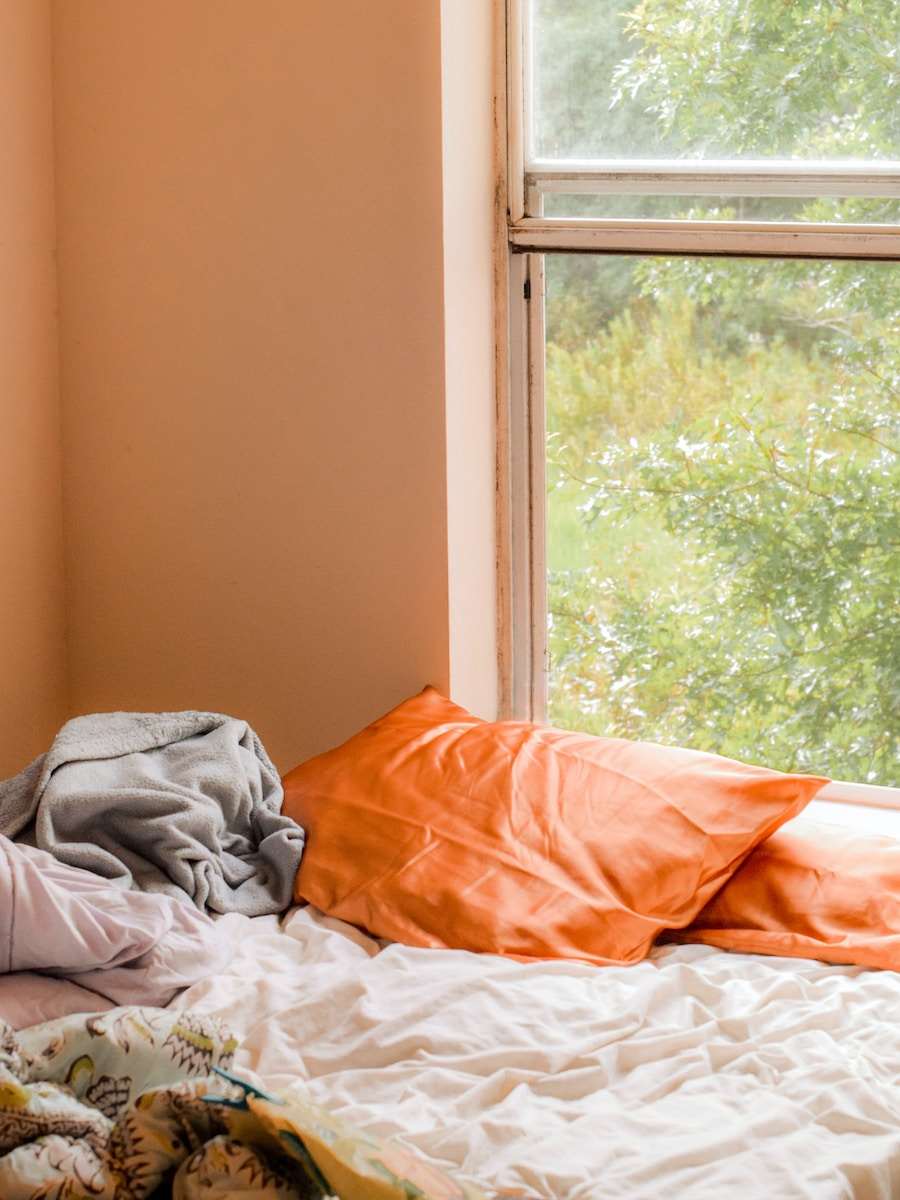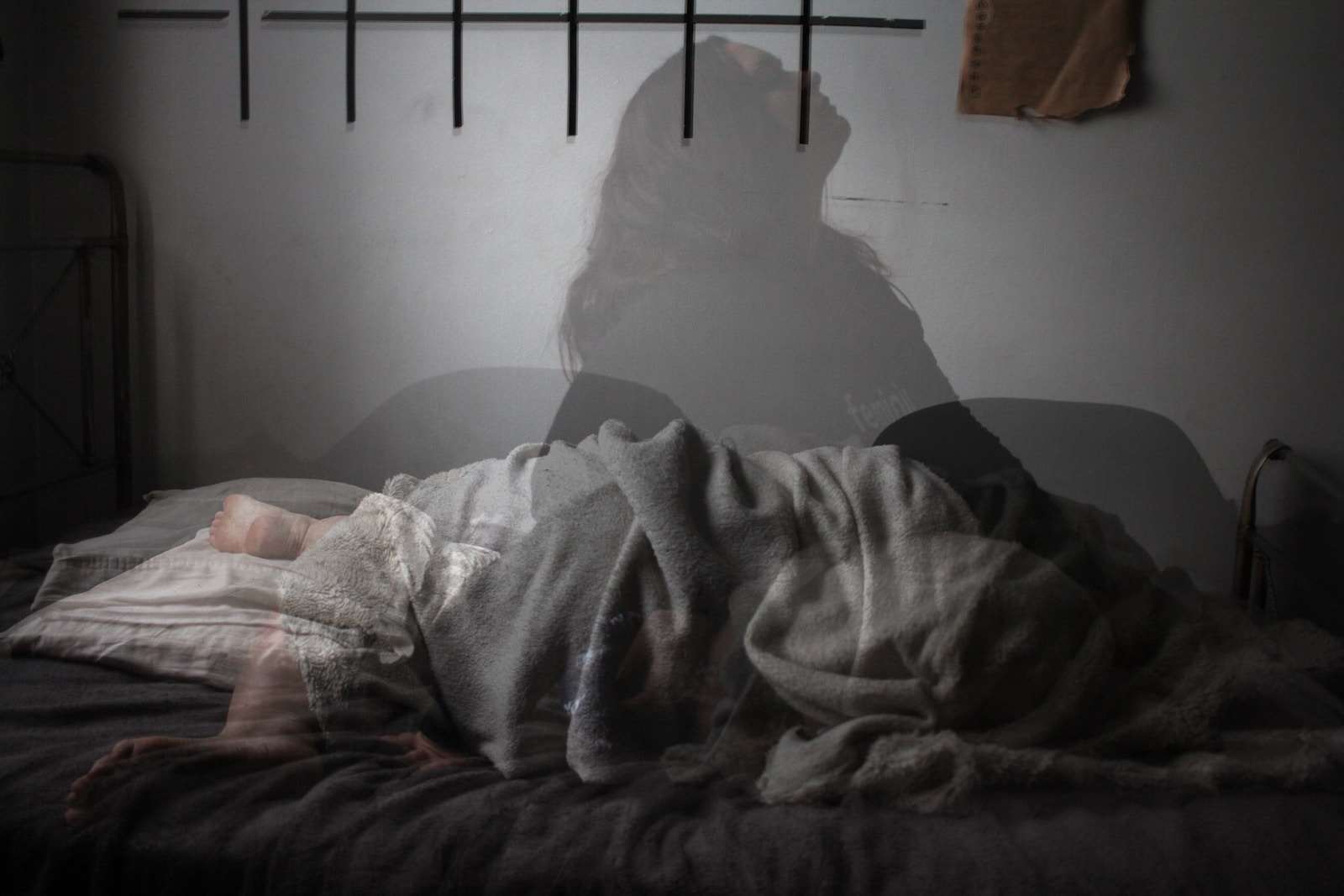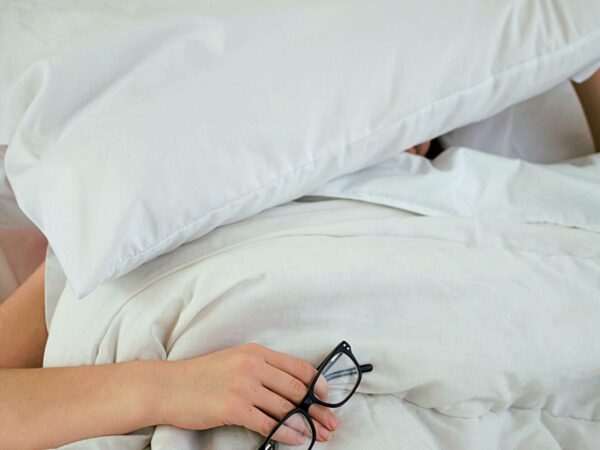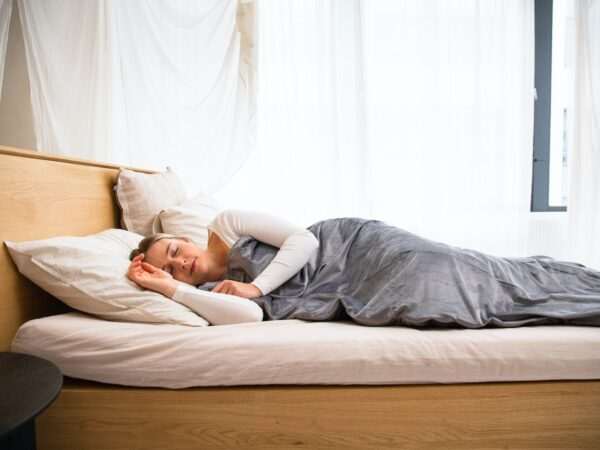Summary. The American Journal of Lifestyle Medicine reports that up to 38 percent of adults have poor sleep hygiene – bad sleeping habits. This can lead to poor quality of sleep and, in turn, to a variety of health issues, such as heart disease, obesity, depression, and fatigue. Some of the most common habits that can have a negative impact on sleep include using electronic devices too close to bedtime, eating or drinking too close to bedtime, drinking caffeine late in the day, and stressing over worries late at night. To ensure optimal quality of sleep, it’s important to create good sleeping habits by avoiding electronics, eating and drinking a few hours before bedtime, avoiding caffeine late in the day, and taking time to unwind before hitting the sack.
Do you frequently have trouble sleeping? Are you one of the millions who struggle to fall and stay asleep? If so, you could be unknowingly ruining your own sleep with certain habits. Many people don’t realize that they are sabotaging their own sleep, but with a few simple changes to your routine, you can dramatically change the quality of your sleep. What are the habits that can ruin your sleep? One of the most common contributors to poor sleep quality is drinking caffeine late in the day.
Identifying Poor Sleep Habits
What Are the Habits That Ruin Your Sleep?Sleep is paramount for your overall mental and physical health. That said, if you have poor sleep habits, it can seriously impact your life. Poor habits can lead to poor sleep quantity, poor sleep quality, and leave you feeling tired and irritable. So what are these sleep-sabotaging habits that you should watch out for?
The first habit is not going to bed and waking up at the same time each day. Your body loves consistency. When you don’t have a predictable bedtime and wake-up time, it is difficult for your body to adjust and make it harder to fall asleep. Although it might be hard to form this new sleeping habit, it will be beneficial in the long run.
Both substances are known to disrupt sleep patterns. Alcohol, despite its initial calming effect, results in fragmented sleep. Caffeine, on the other hand, can stay in your system for up to 8 hours, making it difficult to fall asleep. Try to avoid these two substances for several hours before bed. Third, make sure to avoid screens before bed.
Light from electronic devices can interfere with your body clock and make it difficult to fall asleep. Try to power down your devices and avoid bright screens at least an hour before bed. Fourth, create a cool and comfortable environment in your bedroom. If your room is too hot or too cold, it can make it difficult for you to fall asleep.
Also, consider noise levels in your room. Ideally, it should be as quiet as possible. If not, consider investing in a white noise machine to help you relax and fall asleep.
Unhealthy Eating Habits that Interfere with Sleep

Many of us are unaware that our eating habits can have a serious impact on our quality of sleep. Eating food too close to bedtime, for example, can cause a disruption in our sleep patterns. Eating the wrong types of food—foods that are too fatty, salty, or sugary—can also increase the likelihood of insomnia. Here, we discuss some of the most common unhealthy eating habits that interfere with sleep. Eating Too Close to Bedtime: Eating large meals close to bedtime can cause discomfort and disruption to sleep, as our digestive system works best when we’re awake.
Eating Too Much Sugar: Eating excess sugar can cause a sugar crash that has severe implications for sleep. Eating sugary snacks close to bedtime can spike our blood sugar levels, resulting in difficulty falling asleep and a decrease in the quality of sleep. Eating Too Much Fat: Just like sugary snacks, eating fatty foods can also lead to an energy crash that leads to disrupted sleep. Eating fatty foods such as fried chicken or burgers close to bedtime can lead to indigestion, which can result in insomnia and restlessness. Eating Too Much Salt: Eating large amounts of salt close to bedtime can lead to dehydration, thus resulting in disrupted sleep.
Eating Certain Drinks Before Bed: Many of us enjoy a cup of coffee or tea before bed in order to relax. However, caffeine can prevent us from falling aslee, resulting in insomnia and poor sleep quality. Alcoholic beverages can also disrupt sleep patterns, causing us to wake up earlier than normal or feeling groggy in the morning, both of which can impact our productivity.
It’s important to understand the dietary triggers that can affect our sleep. Avoiding eating close to bedtime, eating foods that are high in sugar, fat, and salt, and avoiding certain drinks before bedtime can all help us achieve a better night of restful sleep. By utilizing healthy eating habits, we can maximize our sleep quality and reach our peak level of performance.
The Impact of Alcohol Consumption on Sleep Quality
Alcohol consumption can have a dramatic impact on sleep quality. While alcohol can initially act as a sedative and reduce feelings of insomnia, in the long run it can actually disrupt and reduce the quality of sleep. Knowing what causes sleep problems and what habits you should avoid can help to improve your sleep. Alcohol disrupts your sleep in several ways. It can make it harder to fall asleep when you go to bed. It can also reduce the amount of time spent in deep or REM sleep and lead to more frequent interruptions throughout the night. In addition, alcohol is known to reduce the overall quality of sleep, leaving you feeling groggy and tired during the day.
This can further disrupt your sleep, leading to drowsiness during the day and making it difficult to stay awake and alert. One of the most obvious and negative impacts of alcohol consumption on sleep is the hangover effect. A hangover is caused by a combination of dehydration, increased respiration, and reduced metabolic rate, all of which can lead to feelings of tiredness and fatigue. The best way to ensure good sleeping habits and avoid alcohol-related sleep issues is to practice moderation. It’s important to limit your intake of alcohol and not drink heavily throughout the week. You should also avoid drinking alcohol in the evening and be careful not to drink too close to bedtime.
Going to bed and waking up at the same time every day will establish a regular schedule and allow you to get more restorative sleep. You should also aim to reduce your caffeine intake, exercise regularly, and practice relaxation techniques like meditation, stretching, and yoga. Taking steps to improve your sleep hygiene can help you reduce the negative impact of alcohol consumption on your sleep.
While it might seem hard to break out of bad habits, making small changes to your lifestyle can have a big impact on how well you sleep. With a few simple changes, you can ensure that you’re getting high-quality sleep and that alcohol won’t be impacting your sleep quality in a negative way. If you’re concerned about the effects of alcohol consumption on your sleep, it’s a good idea to speak to a doctor for further advice.
How Stress and Lack of Exercise Negatively Impact Sleep

Sleep is essential to our wellbeing as it refreshes us and helps us stay productive and alert during the day. Stress and a lack of exercise are two common habits that, when combined, can drastically reduce the quality of our sleep. With so many of us leading hectic lives, it’s not uncommon for us to become overly stressed, and with stress often comes lack of exercise. Unfortunately, these two habits can quickly lead to sleep deprivation and negatively impact our physical and emotional health.
Stress hormones – such as adrenaline and cortisol – as well other hormones like dopamine play an important role in the regulation of our sleep, staying awake and alertness. When we are stressed, the body produces hormones that work against our natural sleep pattern, causing difficulty in falling and staying sleeping. Physical exercise, on the other hand, helps to reduce stress levels and improve the quality of sleep. It can be used to increase energy levels during the day, as well as decrease fatigue, both of which are important for staying alert and productive.
It is recommended to exercise at least 3 times a week in order to reap the benefits on our sleep quality, and reduce the levels of stress hormone. Unfortunately, stress and lack of exercise lead to a vicious cycle where it becomes increasingly difficult to break the detrimental habit of sleep deprivation.
It’s important to recognize when your habits start to negatively affect your sleep patterns, as getting sufficient sleep can drastically improve your physical and emotional health. In order to get quality sleep, it is essential to promote a healthy lifestyle and practice good stress management. Exercise regularly, practice relaxation techniques, and get plenty of rest – you’ll be surprised by how much better you feel and how much more productive you are.
Technology and Screen Time Before Bedtime
With increasing technology access and screen time, there is a greater number of people suffering from sleep related problems due to overexposure of light and content that they consume at night before going to sleep. What are the habits that ruin your sleeping pattern and lead towards sleep deprivation? What you consume right before going to bed plays a crucial role in determining your overall sleeping pattern.
Staying up late to watch crazy sitcoms, binge-watching movies, playing video games and late night surfing are some of the common habits that can negatively affect our sleep cycle. Since the blue light emitted by these devices, keeps you active and reduces Melatonin secretion in your body, which is responsible for promoting sleep, and thus it directly leads to disruptions in circadian rhythm.
This is because of our rising dependence on digital media for entertainment, news, and socializing, which leads to our inability to find alternative sources of relaxation without exposing our eyes to the artificial blue light. The overconsumption of digital media can also contribute to mental health problems like anxiety and depression, which can further lead to sleep deprivation.
In order to improve our sleeping patterns and protect our health, it is essential for us to reduce our digital exposure at least 90 minutes before sleeping. That said, indulging in some quality sleep-friendly activities like reading a book, stretching or even light yoga, taking a soothing bath, sipping some tea, or listening to gentle music can also help in inducing a calmer state of mind and allow us to wake up feeling well-rested and energized in the morning. It is also important to establish and stick to a consistent bedtime routine.
Additionally, tracking your sleeping patterns over a few weeks can also help recognize any disruptions and make adjustments accordingly. Having healthier habits before going to bed can help enhance the quality of sleep and protect physical and emotional health. The flow of blue light emanating from technology devices can interfere with the production of Melatonin and generally disrupt our sleep pattern.
Unhealthy habits such as binge-watching TV shows, playing games and surfing the internet also contribute to decreased sleep quality and further issues like anxiety or depression. To get a better quality of sleep, switch off all electronic devices at least 90 minutes before going to bed, perform sleep-friendly activities and maintain a consistent bedtime routine.
The Link Between Smoking and Worsening Sleep

The relationships between smoking and sleep are interlinked and complex. It is increasingly evident that the habit of smoking can dramatically impact our sleep patterns, leading to a wide range of issues in your everyday life.When a person smokes, the nicotine and other chemicals in cigarettes enter the bloodstream and make their way to the brain, stimulating the body and increasing levels of alertness. This can suppress the natural instinct to fall asleep. The effects of smoking on sleep can be more pronounced at night, as smoking any form of tobacco causes a prolonged and extended period of sleeplessness.
This can have a profound effect on their overall health and wellbeing. Poor quality sleep can lead to a lack of energy and concentration during the day and can even make them more liable to suffer from anxiety and depression. Research has concluded that smoking up to a certain limit of cigarettes a day can impair the body’s cognitive abilities.
The effect is even more pronounced when more sensitive areas of the brain such as the hippocampus and prefrontal cortex are affected. This can affect the areas of memory, coordination and information processing, making it difficult to concentrate and maintain focus. Fortunately, there is an answer.
As soon as you stop, your brain starts to receive oxygen, and this helps to reduce symptoms of insomnia and even reverse them altogether. Furthermore, quitting smoking reduces the risk of related health conditions that can affect your sleep, such as asthma, COPD, and emphysema.
The link between smoking and sleep is clear, and all smokers should be aware of the potential health risks. If you or someone you know is looking to reduce their risk of insomnia or other sleep disorders, quitting this unhealthy habit is essential. While it may be difficult to give up smoking, the long-term benefits can make it well worth the effort.
Simple Healthy Habits to Adopt to Improve Sleep

What are the Habits that Ruin Your Sleeping? Poor sleep can have far-reaching consequences, from the disruption of your daily routines and concentration to the heightened risk of serious health problems such as obesity and diabetes. But it can be difficult to figure out what’s hindering restful sleep—especially since bad habits can accumulate over time. Here are some of the most common sleep disruptors out there, so you can develop good sleep hygiene practices and get the rest you need.
Eating Too Much Before Bed: Eating a substantial meal right before bed can interfere with your ability to fall asleep. Eating lightweight snacks such as a banana or yogurt can be a much better option before bed than a large meal. Drinking Too Much Caffeine: Caffeine can stay in the body for up to six hours, so it’s a good idea to stop drinking coffee, tea, energy drinks, and soda several hours before you plan to wind down for bed.
Staying Up Too Late: Getting enough sleep is essential for your health—it’s not negotiable. And when you stay up late, your body will have to work harder to accomplish the same tasks it did while you were well-rested. It’s easy to get caught up in things like watching that one last episode, but staying up too late can create a cycle of chronic exhaustion that’s difficult to break.
Having an Uncomfortable Bed: You can invest in a great mattress and still find you’re unable to get to sleep. But it’s important to find a mattress that fits your individual sleeping style and provides an adequate level of support for your back. Temperatures can affect sleep, too, so make sure your room is cool—ideally around 68° F—so you can drift off to sleep.
Engaging in Sleep-Unfriendly Habits: Many people like to wind down in the evenings with a few episodes of a show they like or browsing on social media. But getting lost in those activities can directly interfere with your ability to sleep—especially if you’re looking at bright screens right before bed. Allowing Stress and Anxiety to Take Over: Many people find they have difficulty falling asleep if their minds are filled with stressful thoughts.
Learning to manage stress and anxiety can help you both fall asleep and stay asleep throughout the night. Adopting healthy sleep habits can make a big difference in your overall health and wellbeing. By recognizing the habits that ruin your sleeping and making different choices, you can start to establish routines that can lead to a lifetime of better rest!
Bringing It All Together
What are the habits that ruin your sleeping? All of us want a good night’s sleep, however partaking in poor sleeping habits can hinder our quality of rest. Poor sleeping habits may lead to shorter sleep times, restlessness, and fatigue during the day. The most obvious poor sleeping habits are working or studying late at night, eating heavy meals before bed, and drinking coffee or other caffeinated drinks too close to sleep time. These bad habits disrupt our natural sleep cycles and cause us to wake up seeking comfort and support. Eating late at night, for example, leads to food staying in our stomach for a longer period of time, resulting in discomfort when we are trying to get to sleep.
Another poor sleeping habit is that of not getting a regular sleeping schedule. Our bodies rely on the same sleep cycle that works in accordance with sunrise and sunset times. Therefore, if we do not stick to a regular sleep schedule, we can throw off our entire body’s clock which negatively affects our sleep quality. Finally, engaging in too many activities during the day can also lead to poor sleep. Opening laptop or mobile devices while in bed, playing video games, and working on projects can keep our minds buzzing and prevent us from having a peaceful night’s sleep.
Eating late, drinking caffeinated drinks, being irregular with our sleeping schedule, and engaging in activities right before bed are all habits which will limit our sleep time and disturb our normal sleep cycle. Therefore, it is important to be aware of the habits we practice before bedtime and adjust them accordingly. Do you have any poor sleeping habits? How confident are you in achieving a good night’s sleep? What steps have you taken to improve your sleep quality?
FAQ: All Your Questions Answered
What are bad habits while sleeping?
- Not sticking to a consistent sleep schedule.
- Eating late at night, particularly sugary and processed food.
- Drinking caffeine too close to bedtime.
- Doing work or studying in bed.
- Excessive phone or screen time before bed.
- Not exercising regularly.
- Staying in bed too long in the morning.
- Napping excessively during the day.
- Watching TV or using any other electronic devices directly before bed.
- Not making the bedroom a comfortable sleeping environment.
What is the common bad sleeping habit of most people?
This can disrupt sleep patterns and lead to poor quality sleep.
Is sleep part of lifestyle?
It is essential for physical and mental health, memory, productivity, and overall wellbeing.
Does sleep affect your lifestyle?
Not getting enough sleep can leave you feeling tired and sluggish during the day, which can lead to a decreased ability to focus and perform your daily tasks. Additionally, not getting enough sleep can lead to an increased risk of developing various health conditions such as diabetes, heart attack, and stroke. Getting enough quality sleep can help you maintain a healthy lifestyle where you can maintain an optimal level of productivity and mental clarity throughout the day.
Used Reference Links:
https://www.housebeautiful.com/uk/lifestyle/a35054077/poor-sleeping-habits/
https://www.trihealth.com/dailyhealthwire/wellness-and-fitness/4-things-screwing-with-your-sleep
https://nypost.com/2023/07/20/im-a-doctor-here-are-five-bad-habits-that-are-ruining-your-sleep/
https://www.sharecare.com/sleep-disorders/7-bad-habits-that-steal-sleep















